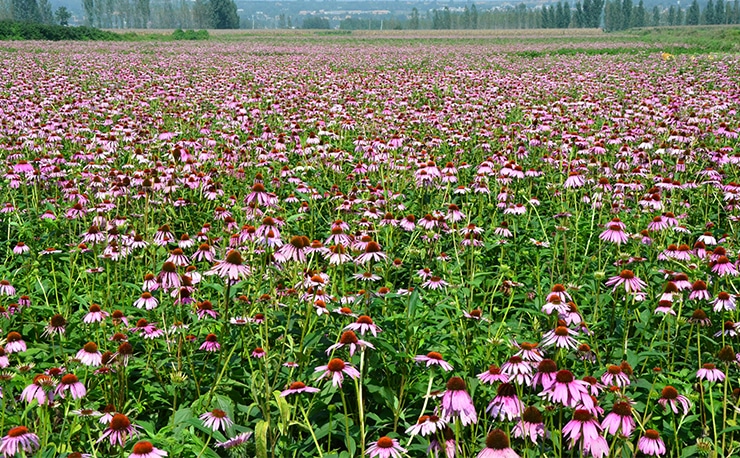Echinacea purpurea is an herb that is very popular for use with colds and flu. Echinacea was used for centuries by Native Americans before the arrival of European explorers. In the 1800s, uses of Echinacea took off in the United States and grass became popular in Europe as well. Echinacea is used in many Western countries, as it is believed that the herb promotes the health of the immune system and minimizes some of the symptoms of the disease. Echinacea or purple cone-flower is a perennial plant of North America that is indigenous to the central plains where it grows in embankments of roads, meadows, fields, and in dry, open forests. It is also known as Snakeroot,
The application of Echinacea purpurea extract- Echinacea polyphenol
- Applied in the pharmaceutical field, Echinacea Purpurea extract is mainly used as a raw material in the prevention of cancer, such as breast cancer, prostate cancer, and colon cancer.
- Applied in the health care product field, Echinacea Purpurea powder extract is mainly used in the improvement of osteoporosis and for women’s menopause symptoms.
- As an immunomodulator, Echinacea Purpurea extract is widely used as a raw material in the field of cosmetics.
- As a food additive, Echinacea polyphenol is widely used in the food industry.
The arrival of the first cold and temperature changes during the day lower the body’s immune system.
This is the best time to put in place those natural cures that help to prevent the cooling diseases typical of the season, avoiding the use of drugs.
Among the plant extracts that have proved to be most effective and safe, we can mention without doubt the Echinacea, a perennial plant native to North America. Its beneficial properties on wounds, burns, and inflammation of the respiratory system were known and exploited since ancient times by the Indios populations.
In recent years, several studies have highlighted the importance of supplements based on Echinacea extracts as immuno-stimulating support to drug therapy usually applied. Pediatricians know well the functions of Echinacea and know that the combination of antibiotics with Echinacea extracts allows a faster remission in the case of chronic tonsillitis compared to the results obtained with the antibiotic alone.
Research carried out by modern herbal medicine has highlighted some of the pharmacological dynamics of active ingredients. The components of Echinacea most important for its activity on the immune system are:
- Polyphenols
- Echinacoside
These substances are fundamental elements to look for on the label to be sure of the quality and functionality of the product. A product with extracts of Echinacea without titration in Polyphenols and Echinacoside is not a guarantee of effectiveness.
There are several types of plants of the genus Echinacea, among which the most important are the Angustifolia and the Purpurea; mixtures of both extracts are usually used to ensure the correct contribution of all the active ingredients.
Echinacea extracts have been the subject of many scientific studies that have confirmed their ability to support and operate the organic defenses against pathogenic microorganisms optimally.
They act by stimulating the functionality of macrophages and lymphocytes, sentinel cells of our immune system, in counteracting specific bacteria and viruses.
Echinacea polyphenol is an excellent natural adjuvant treatment for common diseases of the respiratory tract such as colds, coughs, tracheitis, ear infections, and flu forms when taken systemically (in the form of a dietary supplement). It is also a valid remedy in case of bruises, wounds, small burns, and other skin diseases (warts and contagious molluscs) when inserted into topical treatments.
Echinacea therefore has a non-specific immunomodulatory actionable to fight infections of bacterial/ mycotic/viral origin, combined with a natural ability to stimulate tissue regeneration.
The use of Echinacea has proven to be safe and effective even in the pediatric age: there are bibliographies and texts from the past that describe its use in children from the first years of life.
Children are the most vulnerable and can get sick several times throughout the year, as their developing immune system is continually challenged by frequent crowded public places and carycid pathogens such as schools, gyms, and swimming pools.
How do take Echinacea for the correct prevention of seasonal illnesses?
Doctors and experts recommend taking Echinacea for prolonged periods as a preventive form, but with suspension times.
The advice is to:
- take supplements based on Echinacea for 21 days
- suspend for a week
- resume for another 21 days
- repeat these prevention cycles 2/3 times a year.
This modality is important in order not to make the body accustomed to the presence of an external remedy, even if natural. In this way the immune system has moments in which it acts independently without the support of Echinacea, allowing it to learn and perpetuate the good work of our immune defenses.








